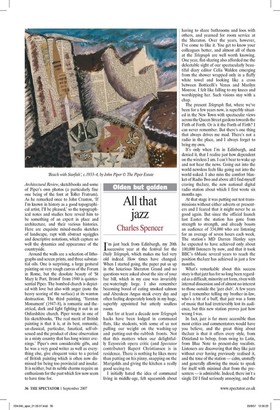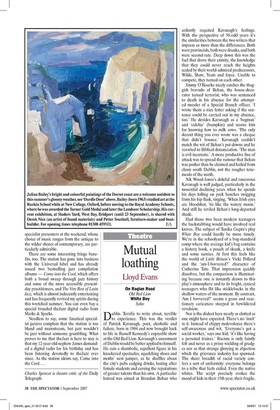All that jazz
Charles Spencer I'm just back from Edinburgh, my 20th successive year at the festival for the Daily Telegraph, which makes me feel very old indeed. How times have changed. When I started going, the paper put us up in the luxurious Sheraton Grand and no questions were asked about the size of your bar bill, which in my case was invariably eye-wateringly large. I also remember becoming bored of eating smoked salmon and Aberdeen Angus steak every day and often feeling desperately lonely in my huge, superbly appointed but utterly soulless room.
But for at least a decade now Telegraph hacks have been lodged in communal flats, like students, with some of us not pulling our weight on the washing-up and putting-out-the-rubbish fronts. Not that this matters when our delightfully Eeyoreish opera critic (and Spectator contributor) Rupert Christiansen is in residence. There is nothing he likes more than putting on his pinny, snapping on the Marigolds and giving the kitchen a really good seeing-to.
I initially hated the idea of communal living in middle-age, felt squeamish about having to share bathrooms and loos with others, and yearned for room service at the Sheraton. Over the years, however, I've come to like it. You get to know your colleagues better, and almost all of them at the Telegraph are well worth knowing. One year, flat-sharing also afforded me the delectable sight of our spectacularly beautiful diary editor Celia Walden emerging from the shower wrapped only in a fluffy white towel and looking like a cross between Botticelli's Venus and Marilyn Monroe. I felt like falling to my knees and worshipping her. Such visions stay with a chap.
The present Telegraph flat, where we've been for a few years now, is superbly situated in the New Town with spectacular views across the Queen Street gardens towards the Firth of Forth. Or is it the Forth of Firth? I can never remember. But there's one thing that always drives me mad. There's not a radio in the place, and I always forget to bring my own.
It's only when I'm in Edinburgh, and denied it, that I realise just how dependent on the wireless I am. I can't bear to wake up and not hear the news. Going out into the world newsless feels like going out into the world naked. I also miss the comfort blanket of Radio Two and above all I find myself craving theJazz, the new national digital radio station about which I first wrote six months ago.
At that stage it was putting out test transmissions without either adverts or presenters and I feared that it might never be as good again. But since the official launch last Easter the station has gone from strength to strength, and already boasts an audience of 334,000 who are listening for an average of seven hours each week. The station's MD Darren Henley says he expected to have achieved only about 100,000 listeners by now, and that it took BBC's 6Music several years to reach the position theJazz has achieved in just a few months.
What's remarkable about this success story is that jazz has for so long been regarded as a difficult, minority art form, riven with internal dissension and of almost no interest to those outside the 'jazz club'. A few years ago I remember telling my brother-in-law, who's a bit of a buff, that jazz was a form of music that had irretrievably lost its audience, but this new station proves just how wrong I was.
In fact, jazz is far more accessible than most critics and commentators would have you believe, and the great thing about theJazz is that it offers every style, from Dixieland to bebop, from swing to Latin, from Blue Note to present-day vocalists. Listeners are discovering that they like jazz without ever having previously realised it, and the tone of the station — calm, unstuffy and generally allowing the music to speak for itself with minimal chat from the presenters — is admirable. Indeed, there isn't a single DJ I find seriously annoying, and the specialist presenters at the weekend, whose choice of music ranges from the antique to the wilder shores of contemporary, are particularly admirable.
There are some interesting fringe benefits, too. The station has gone into business with the Universal label and has already issued two bestselling jazz compilation albums — Come into the Cool, which offers both a broad sweep through jazz history and some of the more accessible presentday practitioners, and The Very Best of Latin Jazz, which is almost indecently entertaining and has frequently revived my spirits during this wretched summer. You can even buy a special branded theJazz digital radio from Marks & Sparks.
Needless to say, some fanatical specialist jazzers complain that the station is too bland and mainstream, but jazz wouldn't be jazz without someone grumbling. What proves to me that theJazz is here to stay is that my 12-year-old nephew James demanded a digital radio for his birthday and has been listening devotedly to theJazz ever since. As the station idents say, Come into the Cool ...
Charles Spencer is theatre critic of the Daily Telegraph.








































 Previous page
Previous page